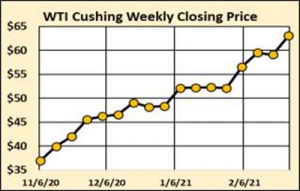Today’s economic report confirms what other reports have indicated: the economy has been soaring in the first quarter. Stock prices are approaching a key test. And as the economy roars along, the Biden administration and congressional Democrats are intent on spending an additional $2 trillion to stimulate it further.
The Week That Was
Today’s report on consumer spending and wages and salaries in January confirmed the economy is soaring in the first quarter.
In a sign of future strength, new orders for durable goods soared in January to new all-time highs. Orders without the volatile defense and transportation components were up 10 percent at an annual rate from their fourth quarter average.
In a pleasant reversal, initial unemployment claims fell by 111,000 in the most recent week. The decline brought the four-week average back slightly below where it has been since October. Another positive development is the number of people receiving unemployment payments. In mid-February it was 4.4 million, down from five million a month ago. However, high unemployment benefits are creating labor shortages across the nation. Lower-income workers can often get more money staying home than by working.
Things to Come
Expect more good news from the ISM surveys of business activity in February (due on Monday and Wednesday). Advanced surveys from Markit show the fastest increases in business activity in six years for both manufacturing and service companies.
Friday’s jobs report is likely to show some improvement from recent months. Private-sector jobs fell by 200,000 in December and rose by only 6,000 in January. These declines were associated with job losses in leisure-related industries. The declines were massive in December and more moderate in January. I believe that there has been further improvement this month. As a result, I’m looking for private sector jobs to increase by anywhere from 50,000 to 150,000.
Since the November election, oil prices have risen by 70 percent.

COVID-19 Developments
The imminent release of the Johnson vaccine should accelerate the sharp decline in COVID cases and deaths. By this summer, the threat from COVID should be substantially reduced and the disease close to being eliminated.
Market Outlook
Stock prices were mixed this past week. While the Dow and small cap stocks were relatively stable, the Nasdaq and Nasdaq 100 fell more than 5 percent and the S&P500 was down almost 3 percent.
The economic news continues to show a soaring economy. Surging business activity has raised the prices for oil and other commodities. Concerns over inflation are the kiss of death for bonds. Longer-term interest rates have recently soared, with the yield on 10-year Treasury notes going from 1.07 percent to 1.5 percent since the end of January.
It didn’t help that Fed Chairman Jerome Powell promised to maintain maximum monetary easing while downplaying concerns over inflation. It also doesn’t help that Congress is preparing to spend another $2 trillion in a misguided effort to somehow further stimulate an already soaring economy.
The latest decline in the S&P500 has moved stocks from 17 percent overvalued to 15 percent. Thus stocks remain significantly overvalued. Even a normal correction would involve significant losses from current levels.
Earlier this month my technical guru, Joe Barto, looked at key support levels. The Nasdaq has broken its level. The S&P500 support is 3,742.
Although stocks are particularly vulnerable when they are overvalued, there is no way to know where they will head in the immediate future. With the exception of the Nasdaq, technical indicators remain positive. This will change if the S&P500 closes below its support level.
As for longer-term interest rates, it appears the recent runup has been too much, too soon. Look for long-term interest rates to stabilize or back off a bit. If so, it should help to provide a more stable environment for stocks.
Outlook
Economic Fundamentals: positive
Stock Valuation: S&P500 overvalued by 15 percent
Monetary Policy: highly expansive












[…] Joe Biden and Democrats in Congress are pushing for a $1.9 trillion COVID-19 relief package. Congress has already approved $4 trillion in pandemic relief and stimulus measures and billions of […]
[…] While Economy Soars, President, Congress Press for Further High-Priced Stimulus […]